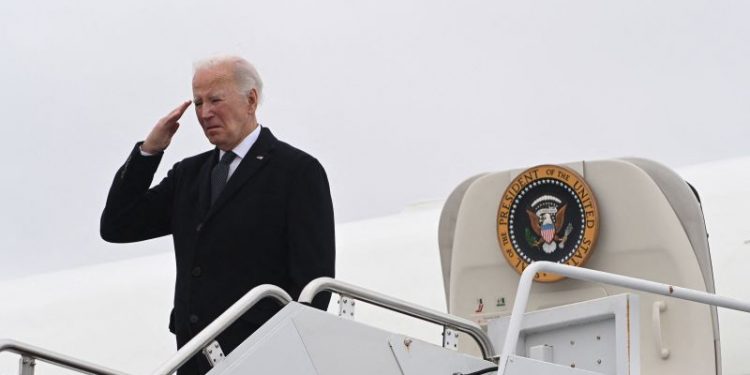It was meant to sound devastating, and likely felt so to the pro-Iranian militias on the receiving end. But Friday night’s airstrikes against over 80 targets inside Iraq and Syria were — so far — a comparatively limited response to the worst loss of US military life in the region in nearly three years.
Friday night tried to sound loud, but will likely not echo for long. US Central Command said the US deployed heavy bombers — the B-1B Lancer — to hit 85 targets in seven locations. The strikes may be determined to have caused more damage when the sun rises. But it was far from the most pain the Pentagon was capable of delivering.
There might be more; US Secretary of Defense Lloyd Austin suggested this was the beginning. But on Friday, the US response lasted just 30 minutes, the White House said. It was short, perhaps sharp, but not a shock.
That was a clear and calculated choice. The Biden administration faced a near-impossible task: Hit hard enough to show you mean it, but also ensure your opponent can absorb the blow without lashing out in return. The US had telegraphed its response for over five days, with senior US officials briefing about its nature, its severity, and even hinting at its targets.
This warning was likely designed to reduce the risk of misunderstanding, and perhaps enable the militias targeted to shift locations, and lessen the loss of life. It may have also been intended to ensure US strikes were not mistaken for the work of Israel, which could have sparked retaliation against the Israelis and risked another cycle of escalation.
This volatility reduced Biden’s options to a sliver of US capabilities. When his predecessor Donald Trump had Iran’s most senior military figure, Quds Force Commander Qasem Soleimani, killed in 2020, the region was far from the brink. But the risk of conflagration in 2024 is the highest it has been in decades. Mistakes, or unanticipated successes, can lead to spirals, and that can lead to unavoidable, wider conflict.
It is almost miraculous that wider conflict has not already erupted in the Middle East four months after Palestinian militant group Hamas’ attack on Israel, and the ongoing assault on Gaza it sparked. (Indeed, you might be left asking, if recent months have not been enough for the Palestinians’ prima facie allies to intervene, what would be?) Yet as of Friday, despite a continuing slow boil of tensions between the US, its allies, and Iran’s many proxies, a wider war still remains unlikely.
Wars normally happen in the rare event that both sides want them, or in the more common occasion when parties determine open conflict is unavoidable, or sometimes when they have run out of diplomatic space. Or they stumble into them through a wild spiral of escalation.
Neither Iran nor the United States want a war. The Biden administration has elections looming, in which it does not need another costly foreign adventure, trouble over its Israel policy, or rising oil prices. Iran’s economy is still shaky, internal unrest is a not-yet distant memory, and it has wider goals of outsized regional influence, milking its technical relationship with Moscow, and the apparent pacy pursuit of a nuclear weapon.
It is for this crisis — seldom spoken of, but loud in the background noise — that perhaps Tehran and Washington are happy to save their direct confrontation. Since October 7, Iran increased its enrichment of uranium to over 83%, bolstering fears it was closing in on the nuclear bomb capability it insists it does not want.
The UN watchdog International Atomic Energy Agency has suggested that Iranian uranium enrichment may have slowed in recent weeks, but the prospect of nuclear proliferation is again closer. In the meantime, Washington is happy to leave this looming crisis off its talking points. And Tehran is content with needling its main adversaries, fixing its internal woes, and avoiding broader conflict.
There will likely follow criticism of the Biden administration for not using the same blunt and forceful approach of Trump in 2020. Yet the perception that might is the only means of projecting strength is dangerous. The US can inflict a lot of damage, anywhere it seeks, at any time. Biden’s decision so far to not send many other Americans to die in a wider conflict, in the name of avenging the deaths of three of their comrades, is not weakness, but the recognition that power is defined by its measured use. His critics would do well to remember that Trump’s bold killing of Soleimani did not stop us getting to this point.






